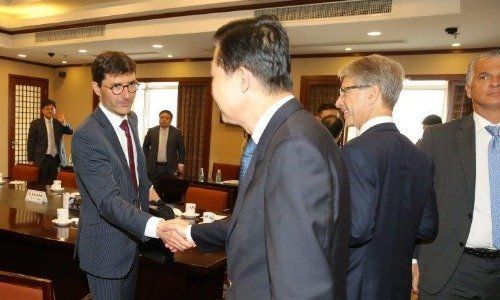China's capital markets remain restricted to foreigners, but Switzerland is launching a promising bid to help further open up the country to western participation, Swiss diplomat Joerg Gasser tells finews.asia.
Switzerland's highest tax diplomat, Joerg Gasser, visited Singapore, Hong Kong and China recently as part of a government-led visit to the region which included UBS, Credit Suisse, and the Swiss stock exchange operator.
The Swiss government under finance minister Ueli Maurer made a case to help China liberalize its economy, Gasser tells finews.asia – a plan based on diplomatic relations more than 65 years old.
Over coffee served with Swiss and American chocolates in his spacious Bern office overlooking the Aare river, Gasser details the role Switzerland would like to play in China's market opening, in the last installment of a finews.asia interview series (read the first part here and the second here).
Joerg Gasser, you were part of a government-led finance trip to Asia last month. Did you come away with anything specific?
I didn’t go with the expectation of discussing specific details, but I ended up being surprised at the responsiveness of officials, in China in particular.
«China interested in talking strategy with us»
Not just on banking issues, but how to address larger strategic questions, views, themes and challenges facing China. This openness surprised me, and is partly the result of Xi Jinping’s official visit to Switzerland in January.
What sort of counsel of China seeking from Switzerland?
China’s five-year plan is quite specific, so to be clear, I don’t think anything we could say will accelerate their opening up to the west in terms of finance. What we can do is explain what the advantages of Switzerland’s financial center. The idea behind this is that when China does open up, Switzerland is poised the benefit.
Why should China be particularly receptive to Swiss ideas?
Due to our strong financial center, it is in China’s interest to intensify their cooperation with us. It’s no coincidence that we have a renminbi hub here in Switzerland, and there is interest to do more.
«We're small, not in the EU, not a threat to China»
We’re small, not a threat to China, we aren’t active geopolitically, we’re not part of the European Union and we have open markets and a stable economy. That’s of particular interest to China: a country with a certain flexibility in regard to the EU and with which they have long and stable ties (the two countries took up diplomatic relations in 1950).
China has stable ties with lots of countries.
Yes, but let me give you a few examples: Xi Jinping visited Switzerland for four full days in January, an unusually long stay that was not linked to another state visit elsewhere – that registered in China. Xi also personally invited the Swiss president to the One Belt, One Road conference, which is unusual.
«ChemChina-Syngenta signals open market»
Switzerland’s open market also plays a role: ChemChina’s takeover of Syngenta is taken as a sign that Chinese firms are welcome here. We may not register these things here, but they are definitely taken note of in China.
What about finance?
Swiss banks and financial providers are active in China as much as is currently allowed, but these economic ties also signal that Chinese banks are welcome here.
«Chinese banks need to be in Switzerland»
Of course Chinese banks won’t bother with the Swiss retail market, but we need those firms here in Switzerland as a way for Swiss banks to be able to invest in China. The relationship is highly complementary and enriches the internationality of our financial center.
Did you come away with any specifics from China, which is a notoriously difficult thing to do?
We’d like Swiss banks to be able to buy larger stakes in Chinese banks (foreign firms are currently allowed to own minority stakes only). You can’t expect China to alter their strategic plans because of good relations with us, but you can place the idea that when they decide to more fully liberalize their markets, we’re among the first allowed in.
What’s in it for China?
We’re neutral and we have no hidden agenda. You could ask why China wouldn’t choose the U.S. We already have a free trade agreement with China. This together with free market access to each others’ financial market makes a good case for Switzerland as a test case for China's financial market opening.
Joerg Gasser began his career in 1996 at the International Committee of the Red Cross, where he worked as a negotiator, including in Pakistan and Iraq. The 47-year-old economist later became a division head for the international aid organization in Geneva. In 2008, he joined the Swiss government as an economist in its justice and police arm. He moved to the finance department six years ago as a secretary general.
Gasser, who studied macroeconomics and international relations in Zurich, was appointed State Secretary for International Finance Matters last July. He is the third person to serve as Switzerland's highest finance diplomat since the agency was set up seven years ago – and by far the youngest.

























